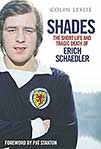{youtube}RYrTL9wptqw{/youtube}
{youtube}wTf1sOl2IDg{/youtube}
 The short life and tragic death of Erich Schaedler
The short life and tragic death of Erich Schaedler
by Colin Leslie
Black & White, £17.99
Reviewed by Archie MacGregor
From WSC 328 June 2014
Erich Schaedler was the son of a former German POW who became an integral part of the swashbuckling, but ultimately fragile, Hibernian side of the early 1970s and was capped once by Scotland – as fate would have it against West Germany. To this day his death in December 1985 aged just 36 is surrounded by unresolved and unsettling questions. This biography sets out to find an answer to why his body was found in his car with a single shotgun wound to the head in countryside near his hometown in the Scottish Borders. Though a police investigation concluded there were “no suspicious circumstances” and it is generally regarded as having been suicide, some, including Schaedler’s immediate family, could not accept that he would have taken his own life.
Colin Leslie, the author of this overdue and exhaustively researched appreciation, is in as good a position as any to try to get to some sort of closure on the tragedy, being both a lifelong Hibs fan and currently sports editor of the Scotsman newspaper. Yet even after scores of interviews with former colleagues, friends, acquaintances and Erich’s older brother John he is forced to conclude that a definitive explanation for what happened remains
“elusive”.
Though one of Leslie’s aims may be left unfulfilled, his book also provides a telling reminder of what a genuinely fine footballer the unheralded Schaedler was. As a player with a ferocious dedication to his fitness regime as well as interests in physiotherapy and coaching that were well ahead of their time in the Scottish game, there is testimony after testimony of how, through hard work, he developed from a raw talent into an international class full-back. The “Turnbull’s Tornadoes” Hibs side that he served so well really ought to have registered more major honours than a solitary League Cup final victory in 1972, but they had a gnawing propensity to fall away in their league campaigns and suffered painful defeats to Celtic, by scores of 6-1 and 6-3, in another couple of cup finals. In a later spell with Dundee Schaedler helped the club notch up a couple of promotions and again made it to a League Cup final.
Across the chapters the shadow of what was to ultimately transpire hangs heavily however. Leslie rightly gives space to reflect on the issue of mental health which football, like other areas in society, still struggles to address in a truly open and grown up way. Many of the interviewees mention that “Shades” could be quiet, withdrawn or “deep” but hardly any saw him as someone who might need help. Although attitudes and awareness may be changing it is a dreadful irony one of his team-mates at Dundee, Ian Redford, also recently committed suicide, as covered in WSC 325. Redford’s own reflections on his former colleague’s sometimes introspective moods – “There were a few demons I think, although I have no idea where they came from” – lend a final poignancy to the recurring theme of this thoughtful book.